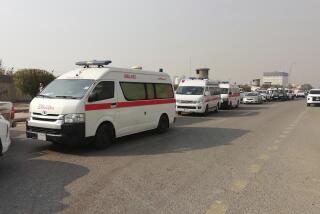Shiite military leader is seized in joint Iraq raid
- Share via
BAGHDAD — U.S. and Iraqi forces clashed with Shiite militants during a raid Friday in the southern holy city of Karbala in which they captured a militia commander accused of orchestrating attacks on Iraqi officials and American troops.
In political developments, President Jalal Talabani, a Kurd, chastised Iraq’s largest Sunni Arab political bloc for suspending participation in the Cabinet this week, saying the bloc has “shown sympathy, if not outright support, for terrorist forces,” including affiliates of Al Qaeda.
The U.S. military said in a statement that Iraqi security forces and U.S. Special Forces who were pursuing “rogue” Shiite Muslim militia leaders in Karbala were attacked by militants firing machine guns and rocket-propelled grenades from three locations. With the help of an attack helicopter, U.S. and Iraqi forces killed about 17 insurgents, the statement said.
Soldiers detained three suspects, including an Al Mahdi militia commander who was in charge of an “assassination cell” of more than 100 militants suspected of killing two Iraqi government officials and attacking U.S. forces with roadside bombs and armor-penetrating explosive devices, the statement said.
No Iraqi civilians were in the area at the time of the raid, the military said.
But witnesses said at least nine people were killed and 28 injured in the clashes, including five civilians and four Shiite militants. The civilians killed included a woman and two children, witnesses said.
They said the shooting erupted after a municipal guard, not recognizing as Americans the men who dropped from aircraft under cover of darkness, fired at them as they approached. Iraqi police seemed to vanish from the streets after that, witnesses said.
Witnesses said U.S. soldiers attempted to detain Sheik Razzaq Aridh, an Al Mahdi leader, but couldn’t find him at his house and eventually detained Firas Sammach, a midlevel militia leader, and his brother.
They said Al Mahdi fighters evacuated their wounded to Husseini Hospital and forced doctors to treat them. U.S. forces approached, trading gunfire until the militants were forced to flee the hospital, witnesses said.
Later in the day, Iraqi officials arrived in Karbala, about 50 miles southwest of Baghdad, to investigate.
Residents trace the violence to a recent decision by Karbala’s police chief to fire 150 officers for having Al Mahdi ties. The firings led to threats from city council members allied with the militia’s commander, anti-U.S. cleric Muqtada Sadr. Two days ago, a roadside bomb exploded in front of the police chief’s house, killing three of his guards.
Clashes also were reported Friday morning between gunmen and U.S. forces near an American base in the city of Kut, about 100 miles southeast of the capital.
The U.S. military announced Friday that a soldier was killed by an explosion near his vehicle Thursday in Diyala province, northeast of Baghdad, bringing the number of U.S. fatalities in the Iraq theater since the U.S.-led invasion in 2003 to 3,646, according to icasualties.org, a website that tracks American deaths and injuries in the conflict.
Talabani told the U.S.-funded Al Hurra satellite news channel that the Sunni Tawafiq bloc had become a criminal element within the government.
He characterized its decision to withdraw from the Cabinet of Prime Minister Nouri Maliki, a Shiite Muslim, as a dereliction of duty.
“They have to carry out their duties which have been appointed by the government,” Talabani said.
He accused the bloc of tolerating Sunni insurgents.
“They go silent when faced with the crimes that are being carried out against the Iraqi people by Qaeda militants,” Talabani said. “This stance is unacceptable.”
Talabani called for an investigation of the bloc’s support for individuals such as Sheik Abdel Nasser Janabi, a member of parliament accused of orchestrating mass killings of Shiites; Sheik Khalaf Ayan, an advocate of armed resistance against Maliki’s government; and Culture Minister Asad Kamal Hashimi, accused of involvement in a 2005 assassination attempt against Mithal Alusi, a secular Sunni member of parliament, that killed Alusi’s two sons.
During Friday prayers, Shiite Sheik Jalaluddin Saghir called the Tawafiq withdrawal unproductive.
“Such a way of dealing with the thorny problems doesn’t do anything except complicate and create a crisis in the political scene,” he said.
Harith Obeidi, a member of parliament with Tawafiq, said during a Friday sermon at a Sunni mosque in Baghdad that Tawafiq politicians were threatened by Iraqi security forces raiding and searching their homes. He said members of the bloc were holding the national government accountable for its failure to deliver basic services, such as electricity.
“When we censure the government -- the president or the prime minister -- it’s not because we want to take away his position,” Obeidi said. “We do it to force them to save the country.”
Elsewhere in Baghdad, a kidnapping victim was released with his car, only to have it explode when he attempted to drive through a police checkpoint, killing him and injuring two Iraqi police officers.
In the central neighborhood of Karada, where a vehicle bomb exploded Thursday in a crowded market, workers removed four more bodies from the rubble, bringing the death toll to 42. At least 62 people were injured.
Police recovered seven bodies in the capital Friday.
molly.hennessy-fiske@latimes.com
Times staff writers Raheem Salman, Saif Rasheed, Zeena Kareem and Said Rifai, and correspondents in Baghdad, Hillah and Najaf contributed to this report.
More to Read
Sign up for Essential California
The most important California stories and recommendations in your inbox every morning.
You may occasionally receive promotional content from the Los Angeles Times.













